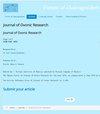碱性氧化物磷酸盐玻璃光学性能与屏蔽性能的相关性及其应用
IF 1
4区 材料科学
引用次数: 0
摘要
在许多组织工程和牙科应用中,生物活性玻璃被利用。这些眼镜具有独特的特性,使它们成为各种应用的有吸引力的候选人。本研究开发了一种新的生物活性玻璃体系,其结构为45P2O5−20CaO−15CaCL2−8KF−(10−x) Li2O−(x) TiO2, x = 2,6和8 mol%。对其在辐射防护中的应用进行了评价。利用紫外-可见分光光度计,在波长190 ~ 2500nm范围内测定了吸光度(Abs)和透射率(T %)。此外,还测定了所制玻璃的光能隙。利用MIKE软件,计算了所研究的生物活性玻璃在15 ~ 200kev能量范围内的质量衰减系数(MAC)。的𝐿𝐿𝐿𝐿𝐿𝐿,𝑍𝑍𝑒𝑒𝑒𝑒𝑒𝑒,𝑁𝑁𝑒𝑒𝑒𝑒𝑒𝑒,𝐻𝐻𝐻𝐻𝐻𝐻,𝑇𝑇𝑇𝑇𝑇𝑇,𝑎𝑎𝑎𝑎𝑎𝑎𝑀𝑀𝑀𝑀𝑀𝑀(线性衰减系数、有效原子序数、有效的电子密度,半值层、十层,价值和平均自由程)生物活性玻璃的计算。根据研究结果,在生物活性玻璃中加入二氧化钛(TiO2)和Li2O等金属氧化物会使生物活性玻璃的衰减特性产生显著差异。结果表明,PCKLT3(𝑇𝑇𝑇𝑇𝑇𝑇2= 8mol%)生物活性玻璃样品的衰减效果最好。本文章由计算机程序翻译,如有差异,请以英文原文为准。
Correlation between optical and shielding properties of phosphate glasses with alkaline oxide and their application
In numerous tissue engineering and dental applications, bioactive glasses are utilized. These glasses have unique characteristics that make them attractive candidates for a variety of applications. A new bioactive glass system with the structure of 45P2O5 − 20CaO − 15CaCL2 − 8KF − (10 − x) Li2O − (x) TiO2 was developed in this study, with x = 2, 6, and 8 mol%. For usage in radiation protective applications, it was evaluated. By using an ultraviolet–visible spectrophotometer, we were able to measure the absorbance (Abs) and transmittance (T %) in the range of wavelengths 190–2500 nm. Furthermore, the optical energy gap of the produced glasses was determined. Using the MIKE software, the mass attenuation coefficients (MAC) of the bioactive glasses under investigation were calculated for energies ranging from 15 to 200 keV. The 𝐿𝐿𝐿𝐿𝐿𝐿, 𝑍𝑍𝑒𝑒𝑒𝑒𝑒𝑒, 𝑁𝑁𝑒𝑒𝑒𝑒𝑒𝑒, 𝐻𝐻𝐻𝐻𝐻𝐻, 𝑇𝑇𝑇𝑇𝑇𝑇, 𝑎𝑎𝑎𝑎𝑎𝑎 𝑀𝑀𝑀𝑀𝑀𝑀 (Linear attenuation coefficient, effective atomic number, effective electron density, half value layer, tenth value layer, and mean free path) of the bioactive glasses were calculated. According to the findings, the addition of titanium dioxide (TiO2) as well as the metal oxide such as Li2O to bioactive glasses generates significant differences in the attenuation characteristics of bioactive glasses. The results indicate that the PCKLT3( 𝑇𝑇𝑇𝑇𝑇𝑇2= 8mol%) bioactive-glass sample had the best attenuation among other samples.
求助全文
通过发布文献求助,成功后即可免费获取论文全文。
去求助
来源期刊

Journal of Ovonic Research
Materials Science-Electronic, Optical and Magnetic Materials
CiteScore
1.60
自引率
20.00%
发文量
77
期刊介绍:
Journal of Ovonic Research (JOR) appears with six issues per year and is open to the reviews, papers, short communications and breakings news inserted as Short Notes, in the field of ovonic (mainly chalcogenide) materials for memories, smart materials based on ovonic materials (combinations of various elements including chalcogenides), materials with nano-structures based on various alloys, as well as semiconducting materials and alloys based on amorphous silicon, germanium, carbon in their various nanostructured forms, either simple or doped/alloyed with hydrogen, fluorine, chlorine and other elements of high interest for applications in electronics and optoelectronics. Papers on minerals with possible applications in electronics and optoelectronics are encouraged.
 求助内容:
求助内容: 应助结果提醒方式:
应助结果提醒方式:


